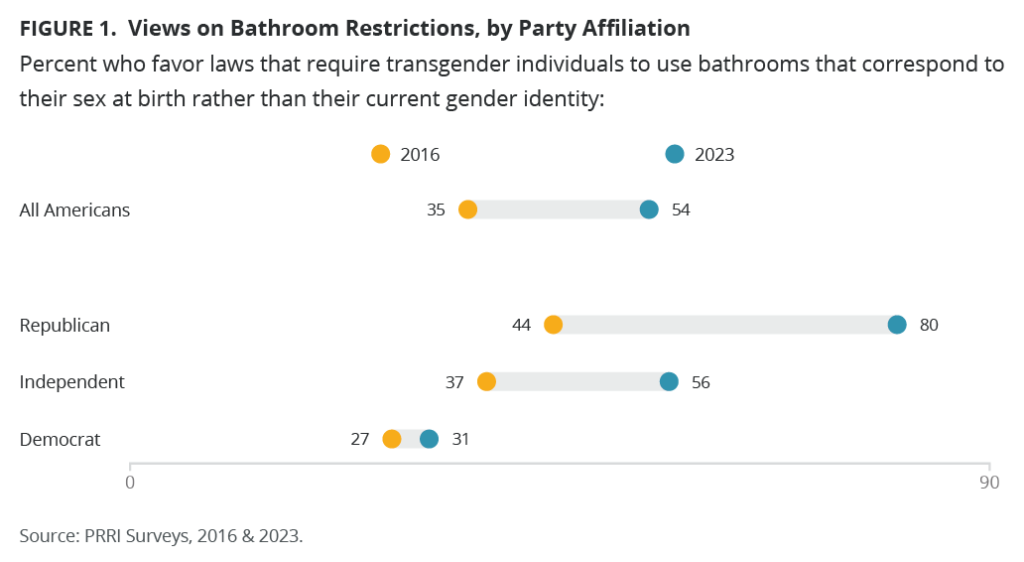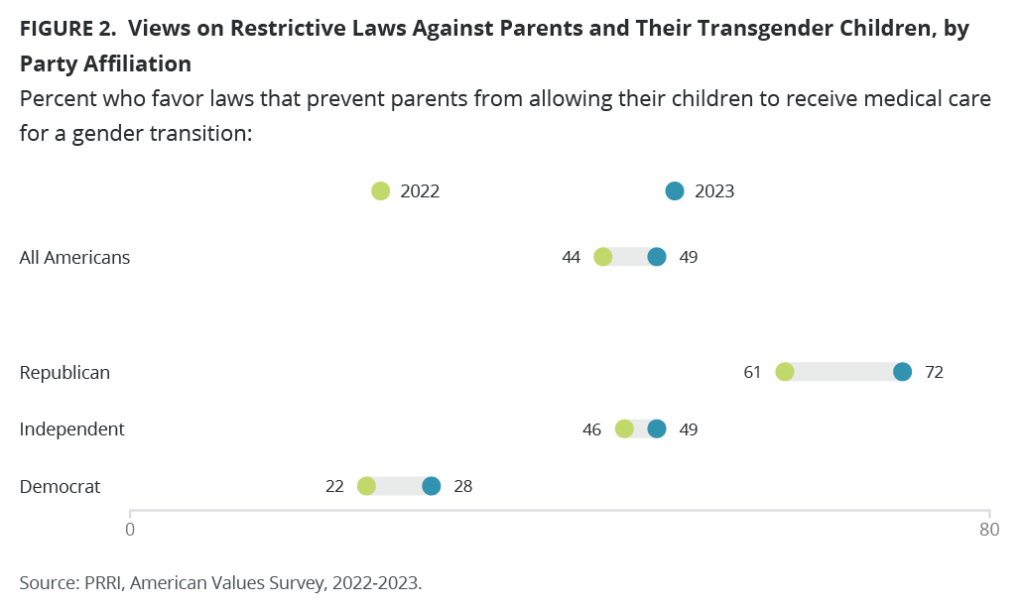Joanna Wuest, Ph.D., is an assistant professor of politics at Mount Holyoke College in Massachusetts where she teaches constitutional law, American politics, and gender and sexuality politics. She is a 2023-2024 PRRI Public Fellow.
For much of the past decade, it seemed like the arc of history bent toward justice for transgender Americans. TIME magazine famously called 2014 the “transgender tipping point,” noting the great strides made by trans actors, athletes, and civil rights activists. By 2020, a historically conservative Supreme Court shockingly ruled that trans employees deserve federal civil rights protections from discriminatory bosses. Given this progress, what might account for the recent downward trend in Americans’ support for transgender rights? One answer might be that the political terrain itself has transformed quite dramatically.
In recent years, both lawmakers and fringe medical professionals have worked to advance bans on gender-affirming care for minors by demonizing gender medicine clinicians, often labeling such established best practices in healthcare as “experimental” and rife with dangerous uncertainties. This is despite the fact that many of the most well-renowned domestic and international medical and mental health associations, including the American Academy of Pediatrics, have opposed legal bans on these potentially life-saving treatments. Additionally, proponents of restrictive, anti-trans bathroom policies have warned against nonexistent dangers such as a wave of predatory trans women violating the privacy and safety of cisgender (or cis) women in public restrooms.
This Spotlight Analysis looks at trends in Americans’ perspectives on timely transgender civil rights issues and how a rapidly changing political context might account for these shifts. In doing so, this analysis joins recent works by other PRRI public fellows who have sought to explain the factors at play in Americans’ decreasing support for LGBTQ+ rights.
Attitudes On Anti-Trans Bathroom Laws
As state governments have increasingly enacted discriminatory bathroom laws that force trans individuals to use restrooms that match their assigned sex status, Americans’ attitudes on these policies have changed accordingly. PRRI’s 2023 American Values Survey shows that a slim majority of Americans (54%) favor “laws that require transgender individuals to use bathrooms that correspond to their sex at birth rather than their current gender identity,” a nearly 20 percentage-point increase from 35% in 2016, when the question was first asked. Republicans have driven much of this change. Today, Republicans are about twice as likely as they were in 2016 to favor these laws (80% vs. 44%). However, Democrats and independents have also become more supportive of such restrictions, with 31% and 56%, respectively, supporting restrictive bathroom laws in 2023, compared with 27% and 37%, respectively, in 2016.
In 2016, so-called “bathroom bills” were a political minefield. North Carolina’s Republican Governor Pat McCrory famously lost his reelection campaign after signing a restrictive bathroom policy into law. This led several large employers including PayPal, Deutsche Bank, CoStar, and VoxPro to pull economic expansions out of the state and the NBA to cancel its All-Star event in Charlotte. The ultimate cost to North Carolina’s economy has been estimated at a $3.76 billion loss in business, sports, and tourism revenue. For several years, the threat of corporate-led boycotts tempered conservative governors, who often refused to sign anti-trans bathroom bills in the face of potentially lost dollars or public disapproval.
Whereas no such bills were enacted between 2017-2020, states have enacted nine laws since 2021, which police restroom use in variety of settings, including K-12 facilities, colleges, and government-owned buildings. Bathroom law proponents have garnered support through fearmongering, warning state residents about LGBTQ+ “groomers” in their public schools and predacious trans women seeking to abuse vulnerable cis women and girls..

Attitudes On Gender-Affirming Care Bans for Children
Just as Republican state lawmakers have become increasingly aggressive in passing anti-trans bathroom laws, so too have they made enormous headway in restricting access to gender-affirming care for minors. Since 2021, when there were 0 bans in place, 21 states have banned some form of gender-affirming care for minors, practices which include therapeutic support for social transition, puberty-suppressing medications, hormonal replacement therapies, and surgical interventions for those experiencing gender dysphoria. These bans are often given frightening names like Arkansas’ “Save Adolescents from Experimentation (SAFE) Act.” Incredibly, some fringe medical experts supporting bans have even tried to spread fear by comparing gender-affirming care to medical atrocities in Nazi Germany.
Americans’ attitudes have changed along with the proliferation of bans on gender-affirming care for minors too. When PRRI first asked whether Americans support “[l]aws that prevent parents from allowing their child to receive medical care for a gender transition” in September 2022, only three states had passed bans into law. At that time, 44% of Americans favored this type of restriction on medical care. When PRRI asked the question again most recently in September 2023, seven more states had passed bans and 13 more states would pass them in the following months. In that time, Americans had become 5 percentage points more likely to favor those bans (49%).

Again, these results are driven primarily by Republicans. More than seven in ten Republicans (72%) favored these laws in 2023, up from 61% in 2022. Democrats also became more likely to favor these laws, from 22% in 2022 to 28% in 2023, while independents remained fairly stable during this period (46% in 2022 and 49% in 2023).
It is important to note that the survey question uses the term “child,” despite the fact that many gender-affirming care practices are clinically restricted to adolescents, who are also affected by gender-affirming care bans for minors. Child patients tend to receive either therapeutic assistance with social transition and/or puberty-suppressing medications, whereas hormonal replacement therapies and surgical interventions are almost exclusively reserved for adolescents and adults. If a respondent approves of gender-affirming care for adolescents but not for children, this wording could skew respondents’ answers toward favoring bans.